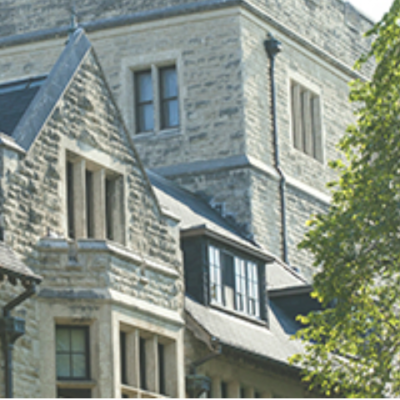Imagine the following over a coffee break in Winnipeg, Canada: a conservationist, a salesman, and a graphic designer sit down to share snacks—back when snacks could be shared.
A few calories later, the conservationist had a solution to her graphic design needs, the graphic designer had a new gig, and the salesman had a list of native plant species needed for a backyard. This is Canadian Mennonite University’s Centre for Resilience at work.
CMU’s co-working lab is a space for purpose-driven organizations and businesses to operate, with the help of CMU’s students. But the Centre embodies more than just civic-minded approaches to work. While there are limits to what we can achieve in a physical space, the Centre is also a gathering place for conversation, imagination, and new narratives—all the more powerful now that gathering has itself (at least for the moment) become hard to imagine.
The Centre nests up in the loft of CMU’s iconic old gothic building, Founders Hall. Students cultivate opportunities to apply their knowledge in business settings while organizations receive help with their projects and to-do lists.
Making the world a better place
Social entrepreneurship (otherwise known as social innovation) is described by author and practitioner Al Etmanski as “the latest descriptor of the ageless human pursuit to make the world a better place. It is a bundle of new learning, technologies and methods blended with the best traditional approaches to social change.” Our entrepreneurs-in-residence represent a broad range of activities, from A Rocha—a Christian environmental stewardship organization that preserves boreal habitats—to Greentech Canada, which markets environmentally friendly air purifiers. They also include a range of “solopreneurs” in marketing, education and the arts.
We’re often asked what resilience refers to. It is the capacity of a system to absorb disruption and retain a similar function and structure. Plenty of things are being disrupted these days. When we opened just a couple of years ago, we talked about ecological and economic resilience. Now, as a pandemic rages on, we’re referring to resilience of all kinds: social, emotional, technological. Some residents have worked on initiatives that embody this kind of work—whether through the use of sacred knowledge and agricultural partnerships on campus or the use of Greentech’s air purifiers to protect against pathogens in CMU’s buildings. These are humble examples of resilience-in-practice.
A narrative that brings people together
As a space for imagination and teaching, many students—and indeed, broad stretches of the public—yearn for a narrative that brings people together rather than dividing them. Elements of such a narrative have already been articulated:
- we are part of an interconnected, living planet;
- it’s possible to do business in a world that works for all;
- there’s an urgency in doing so before we cross irreversible tipping points;
- we can be happier and more fulfilled;
- this kind of social change needs to be as inclusive as possible.
Yet traditional capitalism versus socialism political narratives continue to dominate the general discourse.
My own experience in business and grassroots change has revealed how consequential the idea of a just and sustainable economy is, and how the transformations we’re working toward require not only a shift in our material use of resources, but also a shift in consciousness—toward the rehabilitation of sacred knowledge and practices that were deemphasized only a generation or two ago. By that, I’m referring as much to land-based knowledge as I am to the soft skills required to work with others and navigate change.
This is an important and fraught process because it requires navigating different perspectives about the “good life.” But if we are to build a coherent, peaceful narrative to navigate this time of change, we’ll need to respect the conflict occurring in hearts and minds as we all struggle toward courage; into cosmology-shattering information; to reconcile the old with the new. We’re charting a course for recovery and rehabilitation as a route to redemption, so to speak. This has become all the more apparent over these last 15 difficult months. Where better to embody that kind of approach than CMU?
James Magnus-Johnston is the founder and director of CMU’s Centre for Resilience. He is also a researcher in the field of ecological economics and teaches related courses at CMU.
